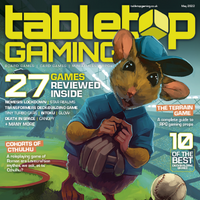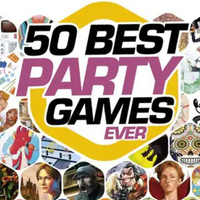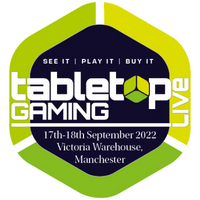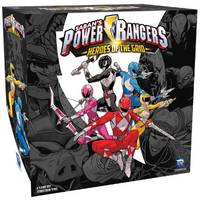16 May 2022
|
But what is Blaseball?
No one really knows what Blaseball is. The closest we can get to experts comes in the form of board game designers Michael Fox (Megacities Oceania) and Rain Watt. Watt is the lead designer on Blaseball: The Card Game and is noted for having created albums of somewhat ecstatic music around the computer generated events of Blaseball.
And generated is key here. Blaseball, as it exists is a kind of sports parody online – although it’s treated very seriously by those in the know. Watt introduces us to the concept, “Blaseball is a browser based absurdist sports simulation which 20 or more fictional teams compete at a sport that is very similar to baseball, but not quite, because there’s other weird stuff that goes on.”
“There is supernatural weather, players swap teams or die, or come back from the dead. For a while,” adds Watt, “wins were ‘unwins’ – and decreased your wins if you won. So, it’s baseball with a lot of extra dense nonsense around it.”
All of this is in aid of allowing you, the observer of these shenanigans, to bet your hard earned (fictional) money on events that will influence the game in one way or another.
“You can buff up your team, or buff up your players, or steal the opposing team’s best players,” says Watt, we clarify whether that’s steal in the sense of bring them to the team you’re supporting, or simply kidnap them. Both Watt and Fox confirm that either option has been on the table at certain points.
“And then there’s gods,” say Fox, “because, of course. It’s glorious and ludicrous. Oh, and a season takes a week, so there’s 100 games – which is basically one game every hour. And then there’s a knockout, playoff championship at the end. Like the World Series, but obviously way better.”
Under this whirlwind of information, lies the core of what Blaseball is about, the meta-level intrigue, the write ups, the fandom, and everything that gets generated by human beings in response to this wildly shifting fantasy sports game. Fox suggests you don’t need to get involved in the deep lore to enjoy the game, as there are so many access points to Blaseball – whether that’s a deep wiki dive, a podcast, or listening to Rain’s (150 person) band The Garages albums, you’ve got plenty of the surrounding culture to dive into. And of course, now, we have an exciting way to experience Blaseball on our tabletops, with Blaseball: The Card Game.

RIPPING OPEN THE FOIL
Blaseball: The Card Game, while not actually a trading card game (the logistics of TCGs are beyond many publishers, let alone two person teams like Wayfinder), spiritually focuses on the classic collectable card games of the 1990s.
“Fan games exist for Blaseball, a lot of very thoughtful small tabletop RPGs and that kind of thing,” say Watt, “my particular calling is for classic collectable card games of the 90s and 00s. I thought, what if this was a card game? But rather than replicate what Blaseball does, we’re zooming right in to one single game where you’re two teams going head-to-head in a classic card battler style.”
“From a storyline point of view, it is the ninth inning of a currently scoreless game of Blaseball – a rarity in itself,” says Fox, “we just micro-focused in to this top and bottom of an inning.”
The structure of the game is extremely baseball, so much so that when asked, the pair gloss over the basics (you have fielders and pitchers if you’re the pitching team, a batter and a line up if you’re the batting team) – but it is evident. One player pitches, the other bats, and the goal is to get around the four bases – or to stop your opponent doing so.
“If you are the batting player, you need to score as many runs as you can, before your deck runs out. If you’re in America you know how standard baseball works. If you’re in the UK, maybe you don’t have as much of a grasp on baseball, but you do understand rounders because we all played it at school,” says Fox.
Each deck in Blaseball: The Card Game is comprised of 24 cards, with 14 player and ten special cards.
“That’s the deep secret behind both this and Blaseball is that they’re secretly just sports games,” says Watt conspiratorially, “I think there’s a nerdy revulsion at admitting you’re into sports even a little bit, even though sports is the nerdiest thing on the planet.”
“Especially baseball,” says Fox, “baseball is just numbers. And I’m speaking as a baseball fan.”
But of course, we’ll leave sports to the real nerds. This is about board games.

SUNNY WITH A CHANCE OF PRETTY MUCH ANYTHING
“We’ve kept it simple,” explains Watt, “every player has their ability to hit a ball, throw a ball and catch a ball – and that’s their three stats. And then the Blaseball element comes in.”
“The players that we’ve chosen because they all come from the ‘discipline era’ of Blaseball – so they are they’re all established characters within the canon because we were able to go back and pick our faves, all their abilities and all their interactions.”
Which feels like a weird thing to say – these are characters from a kind of ‘golden age of Blaseball’ – which is another weird thing to be writing down. It’s extremely Blaseball however to have these arbitrarily created sections of the game’s history (a wiki tells us this marking of an era was something decided by the Blaseball Gods, as a consequence of opening the book of forbidden knowledge). It’s clear that part of the enjoyment of creating the game for both Watt and Fox is to revel in the way the strangeness of the online game appears in cardboard – there’s an opaqueness in language which while is often present in board games, isn’t usually as fun as this.
“We’ve cherry picked a whole bunch of our favourite players. We didn’t want to just pick two teams for this first set. For this release, we’ve got the Underdogs versus the All Stars. The All Stars are kind of like ‘the faces’ of Blaseball. They’re the heavy hitters. They’re the ones who are going to do everything they can to win,” says Fox, “and then on the opposite side, you’ve got the Underdogs who are going to do everything they can to win.”
As a coach you need to know about one of the key factors in the card game is vibes. Vibes, or vibe tokens, are used as an in-game currency for trigger players’ special abilities and can be used for dice manipulation.
“There’s a sense of ‘sports anime’ about the whole thing – there’s a heightened sense of drama and emotion whenever you get into a game on this kind of scale,” says Watt, “you’re deciding whether you’re going to spend all of your resources to just make it to one extra base.”
Each player places their selected batters and pitchers face down, and reveals them as each takes their place at the pitcher’s mound or home plate. Then the pitcher decides who might be catching the ball, should a successful hit be made. In addition, there’s a special area of the board where players can set their special cards, ready to be flipped when the time is right.
“Those could be things that affect the players of the coach and will give you new all-encompassing rule-bending abilities,” says Fox.
The first ball is pitched with a roll (which can be manipulated with vibe tokens or abilities), the batter does the same, and then depending on the result you’ll be watching the ball fly into the air (maybe to be caught) or a strike fizzle past an embarrassed batter. Catching can be a risk as the batting player can get an extra base from the fumble.
“So at any point you’re kind of in that position where you’re like, ‘I could spend all four of these vibe tokens that I’ve built up, and that’ll get me to first base. Do I do that or not?’,” says Watt, “it’s those moments where you’re falling behind and you suddenly go into your mind palace and time stops and you’re like, ‘how do I make this dice roll not suck?’.”

PITCHING FOR PEANUTS
We need to talk about peanuts. Probably, for most of our British readers, peanuts are something that’s associated with baseball only through versions of baseball seen in cartoons. While it’s reported that some 5.4 million bags of peanuts are sold in Major League baseball parks each year, they don’t come anywhere near to the strangeness of peanuts in Blaseball.
Here, peanuts are a result of rolling a one on the dice, and collected on a card – which can then be spent at a later point of give a player a “yummy reaction, which boost their stats,” explains Watt. There is of course, a bad peanut card here too – which can drop a player’s stats – ideally to be played just after your opposite coach has played a vibe token.
This brings us to the jolly ‘take that’ aspect of the game, which is designed to lean into the trading card game back-and-forth feel. This is partially to provide a sense of wackiness, but also as a kind of balancing mechanic. While each team can field the same number of players and powers, there’s a fairly predictable stat-swing towards the All Star team.
“The Underdogs are slightly on the back foot, would you believe, in that regard?” says Watt, “they make up for it in terms of their abilities that have this ‘take that’ element to cancel an ability. They might take off vibe tokens or steal an items – that’s a thing.”
“The All Stars have their own tricks up their sleeves. When they can’t beef up their players they can make someone a captain arbitrarily, so they get access to some special cards,” explains Watt, “both teams have their own individual approaches to the game – and the feel very different as well.”
BRINGING BLASEBALL TO LIFE![]()
It’s important to note that Blaseball has no artwork, no character designs, and really no graphical output at all. Everything visual that exists around the online game’s experience is tied directly to the fandom that it has developed. This leaves Wayfinder in an interesting position – as the game is sanctioned by The Game Band, who own Blaseball – are they in a position to create an official Blaseball canon?
“We are creating a canonical Blaseball art,” says Fox, “I think everything has worth in the greater extended Blaseball universe, and it’s like Blaseball: The Card Game part of the multiverse is definitely its own thing. It’s like a splinter version of the site – it’s official – but we definitely wanted to have those nods to things that were definitely their version of the universe and then make changes to our own ones.”
“When people see a card like Richmond Harrison or Scratch Deleuze, they’re going to see what we see that character as,” continues Fox, “alternatively, there are some characters that might not just have one version in the card game universe.”
“There are many canons of Blaseball,” adds Watt, “we’ve worked to make ours internally consistent. It’s its own thing and has its own vibe.”
The artwork development took off from a place between the fandom and wiki theories as a starter – although, only the parts which might be described as ‘true’, whatever that can mean in this context.
“Obviously the fandom is really important. When you go to the Wiki, a lot of the stuff that’s on there is like fandom created stuff – existing art even. So, it was really important to not duplicate any of that,” says Watt, “we’re making something unique and new here.”
“Having said that some characters are just the way they are. You cannot get around the fact, for example, that Richmond Harrison is an axolotl,” Watt adds, with absolutely certainty, “that’s just a fact that everyone has chosen to accept about that character. In addition to that stuff, occasionally, I would just give the summary of a character to the artist as well. I gave them one extra little bit.”
It’s a process that leads to an interestingly cohesive set of artworks for the cards which would be at home in any of the wackier trading card games. The directions given also included the slightly nebulous, but important nudge towards the ‘vibe’ of a character.
“This character is a mouse this character is a frog. This character has this sort of energy, of ‘a grilling steak dad’,” says Watt by way of an example, “beyond that, I sort of let the artists do what they do. I’ve been told that’s fun for them.”
“I believe they enjoy doing this sort of character design element. It also means that we’ve got this really diverse range of characters. And I mean that in every sense of the word, because we’ve got artists who are able to draw from their own experiences here.”
This last part is more to do with inclusion and representation across the human aspects of the card game (because robots are pretty well represented in the hobby, after all).
With this cascade of weird and wonderful design throughout the game, there’s a clear desire to expand the universe of Blaseball: The Card Game. After all, once it’s here, there’s got to be another season, right?
WHAT’S NEXT?![]()
Wayfinder Games are currently working hard to get the game out there and into people’s hands.
“We then, hopefully, get to dive deeper into our side of the multiverse – we get to make more stuff, more teams, we get to introduce more weird and wonderful rules – but the prize we have our eyes on right now is just making this,” says Fox, “we now know that the Blaseball game that we have is the best that this set of cards can be. This is a really good, entertaining, and easy to pick up gaming experience, even if you know nothing about Blaseball.”
The pair are currently in talks with a very exciting distribution partner that’s a little bit outside of the realms of normal retail channels – which we cannot disclose at the time of press. The funding for the game is provisionally slated to go through IndieGoGo later in the year. Until then, we’re just waiting for the next season to start.
Looking for more?

This review came from Tabletop Gaming Magazine, which is home to all of the latest and greatest tabletop goodness. Whether you're a board gamer, card gamer, wargamer, RPG player or all of the above, find your copy here.
Get your magazine hereRead More...

If you like party games, this is the one to read – a feature straight from our special issue of Tabletop Gaming Magazine giving you the top 50 party games ever. You'll have to let us know which one would be your number one!
Grab your party hat!
Join us in person

We can't wait for Tabletop Gaming Live 2022! An epic weekend in Manchester full of board games, card games, roleplaying games, wargames and more, with amazing exhibitors, great games, and an opportunity to game together in person.
See you there!Treat Yourself!

Have you visited our game store? We have everything from mystery boxes, to games and accessories – including the above Power Rangers: Heroes of the Grid, with a great discount! Head over to find your new favourite game.
Visit the Game Store









Comments
Login or register to add a comment
No comments